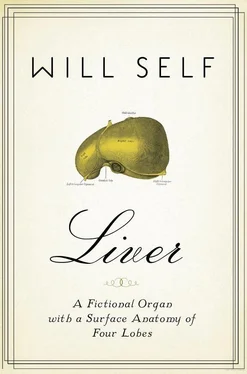And when Joyce reached the end of the reel, at Saatlenstrasse, there was the Minotaur: Isobel, bullish with booze, crashing up and down outside the apartment block.
Of course, it hadn’t been the media references to ‘the English woman who has cheated Doctor Death’ that had sent Isobel bellowing and snorting towards Oerlikon, but Vreni Stauben, who, having had Joyce explain to her, perfectly matter-of-factly, that her daughter was an alcoholic, still insisted that it would not be mu t-terlich to so reject her only child.
Isobel kicked at the wheelie-bins in the front yard. She shouted, ‘Mummy, what’re you doin’, Mum? Are you a fuckin’ ghost , or what?’
At least the Tamil man — whose mouthful, Joyce had gathered, was Chandrashekra — wasn’t with her this time. He had come on other occasions, and the way he loitered had seemed far more menacing than Isobel’s acting up.
Since he wasn’t in evidence — and her daughter was making still more noise than usual — Joyce let her come up to the flat for her handout. The beast , with greasy horns of hair on her spotty forehead, trampled from bedroom to living room. ‘Very ni-ce, very ni-ce,’ she snorted, laying hoofs on curtains and upholstery, her nasal vowels a bad impression of a Birmingham hausfrau.
Stupidly, Joyce offered her tea. Isobel laughed like a dirty drain: ‘Tea? I don’t want your fucking tea, Mummy.’ She was staying with Chandra at some kind of refugee hostel; the wardens were ‘cunts’, but, so long as he smuggled her in late at night and she left early in the morning, she could get away with it.
‘But what’re you getting away with?’ Joyce made herself some peppermint tea anyway, hating herself for her neurotic little sponge-dabs on the worktop; old womanish , fending off dirty disorder and dusty death with nothing but habit .
She sat on the sofa nursing the hot vessel. ‘Why’re you still here, Izzy? Look, if you go and get your things and meet me at the airport, I’ll buy you a ticket home right away — ’
‘I’m not bloody going!’ Isobel bellowed. ‘I’ve told you that before, an’ I’m specially not going now I know you really are the fucking saint you’ve always behaved like.’
‘Sit down before you fall over, Isobel — and what do you mean by that?’
‘I may not be able to read bloody German — but Chandra can; we saw the thing in the paper. Oh, Mum.’ She fell to her knees and came snuffling across the carpet. ‘What’ve you got yourself involved in — are you getting treatment from some quack?’
Sympathy, Joyce thought, didn’t suit her daughter. To be on the receiving end of it was to feel damp and mauled . ‘No,’ she said firmly. ‘I’m not getting treatment any more, Isobel, there isn’t any. You know that — I’m terminally ill — ’
‘Terminally ill?’ Isobel laughed bitterly. ‘Have you looked in a mirror recently, Mummy, you look bloody better than I do!’
There was a deep pathos in this: the bland room, barely furnished — a show home for a second life; the bigger, younger woman, her face rubbed with alcohol and then scraped raw by distress, kneeling at the sharp knees of the older, trimmer woman, who would apply no salve.
However, this awareness came later, after Isobel had got her 200 francs, crashed off down the stairs, bashed through the front doors, then disappeared down the road in the direction of the tram stop, still bellowing. It came later, after Joyce had gone across the landing, then downstairs, to apologize haltingly to Herr Siemens and Frau Pfeiffer, both of whom had stared at her blankly, while denying that they had heard anything untoward.
This came later, when Joyce sat in the darkness, staring out at the spider webs that veiled the orange head of the street lamp below her window. Quantus tremor est futurus, Quando judex est venturus, Cuncta stricte discussurus. She couldn’t pinpoint exactly when it had happened, but the abundantly rich and complex orchestration had drained away, while the polyphony had dwindled to a single, deep, dry voice that spoke to her alone, of a dread , when the Judge shall come, to judge all things strictly .
On Sunday mornings Joyce went into town by tram for the noon mass at St Anton’s. She alighted at the Bahnhof Stadelhofen and walked the last kilometre, summoning herself for the ordeal. Many eyes surreptitiously tracked her each time she entered the church. She knew what they sought: the submissive self-quartering of a genuflection. It was not enough that she be seen to be saved by their god; it was necessary that, like a sulky child, Joyce say ‘thank you’.
The service was always well attended, and Father Grappelli, together with his deacon, made up for what they may have lacked in soulfulness with well-choreographed aplomb, moving from altar to pulpit and back again: slow-revolving dancers in white surplices. The congregation were dutiful under dull stained-glass windows; they sang louder than English Anglicans, but no more tunefully. The children fidgeted, although not much. Modern Jesus leant against his big cross above the altar, a bad Giacometti with a face like a pious turd. Joyce followed the order of service, telling herself that mouthing the responses and hymns was improving her Schweizerdeutsch accent by the Suzuki Method.
When Ueli Weiss and Marianne Kreutzer were alone, they sat near the front on the right, but when Weiss’s son was with them they took the last pew, and sat by the aisle so that Erich could come and go as he pleased. Joyce assumed the young man had cerebral palsy — he certainly moved in the crabbed, spasmodic fashion of some CP victims she had seen.
When Joyce first encountered Weiss with Erich, a fortnight before, he had been pushing him on a swing in the playground next to the church. It was an incongruous sight: the child big enough to be the father to the man. Weiss hadn’t bothered with an introduction, speaking of the forthcoming festival of Sechseläuten , when the old winter — in the form of a straw dummy stuffed with fireworks — would be dismissed by flames.
As they had chatted stiffly, the young man’s white face plunged between them, again and again, ferociously concentrated on his controlled abandonment. Erich was better looking than his father. He had a beautiful mouth, such as it was impossible to credit Weiss’s moustache with concealing; and the chocolate eyes were deeper, more profound. Was it fanciful to see in them an anguished intelligence, which had been released by the dead girl’s touch but remained trapped inside brain tissue petrified by anoxia?
While Father Grappelli intoned the eucharist, the manly boy ranged up and down the nave, in and out of the side chapels. When reverent men came up to assist with the communion, Erich exited into the churchyard; Joyce could hear him out there, groaning. Was it because of his status as a miraculous being that Erich was allowed such licence? Or was it only another aspect of the Swiss’s peculiarly repressive liberalism, whereby the community permitted anything, if the individual could overcome his or her own massive internalized constraint?
Were it not for those accusatory looks, Joyce might have taken communion. The Lord’s Prayer — this was the muzak of spirituality; and the sign of peace was a brusque handshake, a murmured ‘ Frieden ist mit dir ’, then Grappelli and his deacon got the picnic ready on the already laid cloth. It was, she thought, no worse flummery than the Anglican rite, nevertheless she balked; bloodwine, fleshwafer, Scottie’s Liver Treats .
This went on throughout Easter, all in a month of Sundays. There were no more convivial lunches at the Kronenhalle; after the service Joyce chatted with the priest for a short while, then made her way back to the tram stop. Not even Vreni Stauben seemed inclined to invite her to the Universitätstrasse apartment for coffee and cakes. As for Reiter — on whose companionship Joyce had pinned such high hopes — by the end of the month he was gone.
Читать дальше












